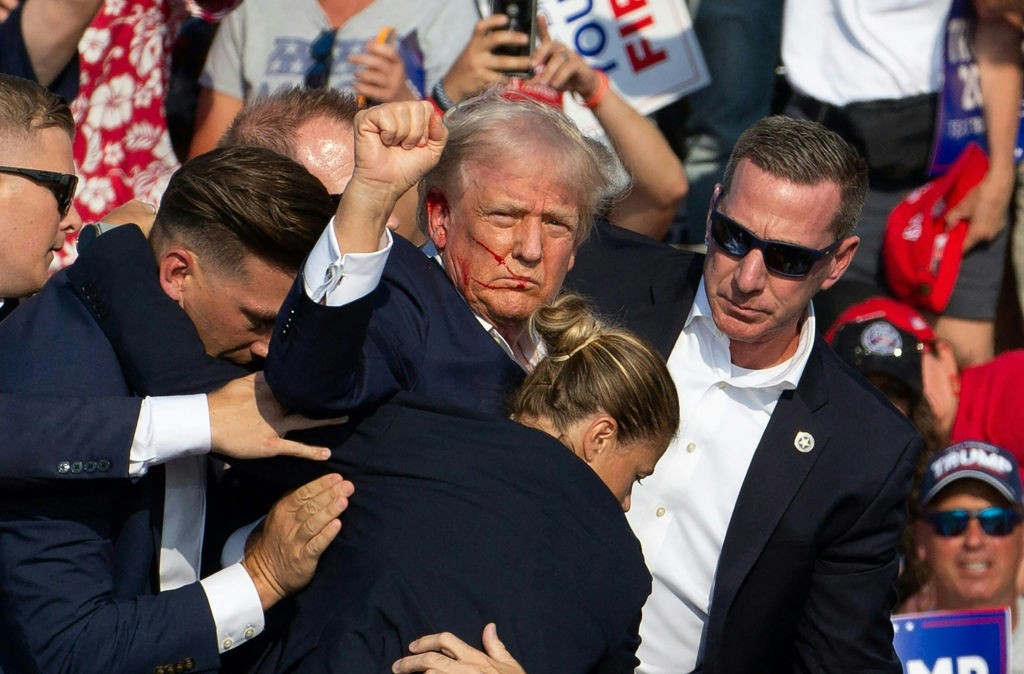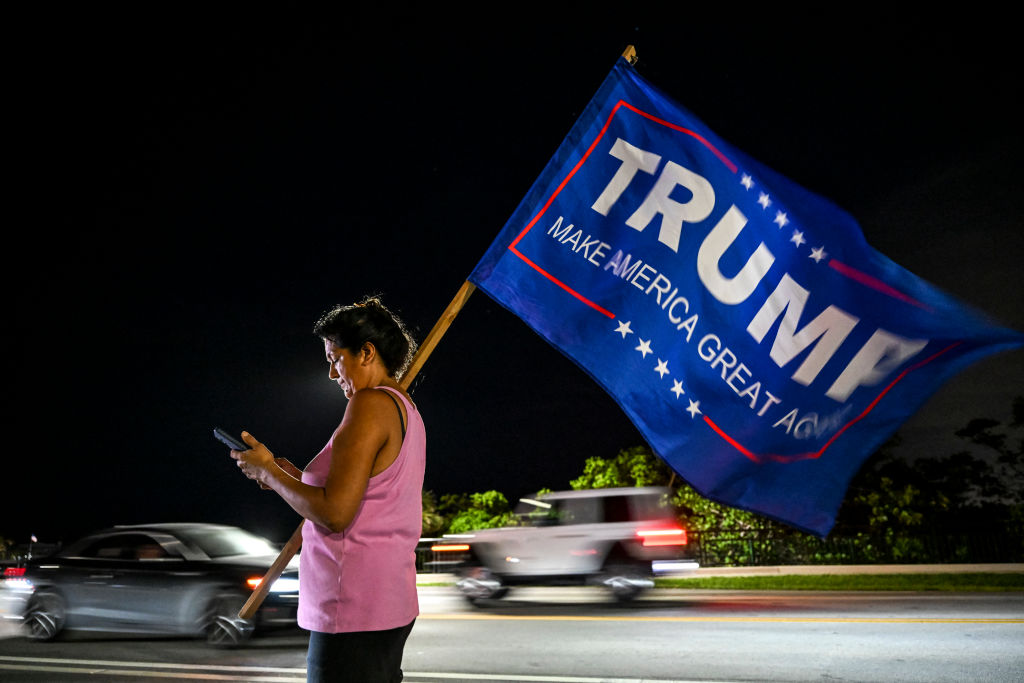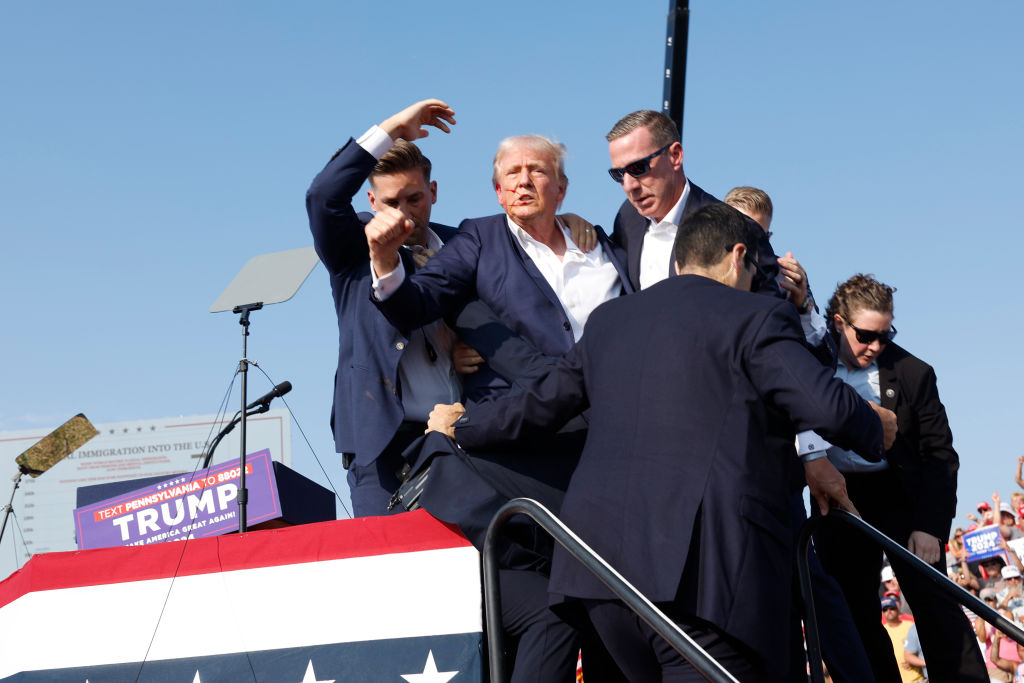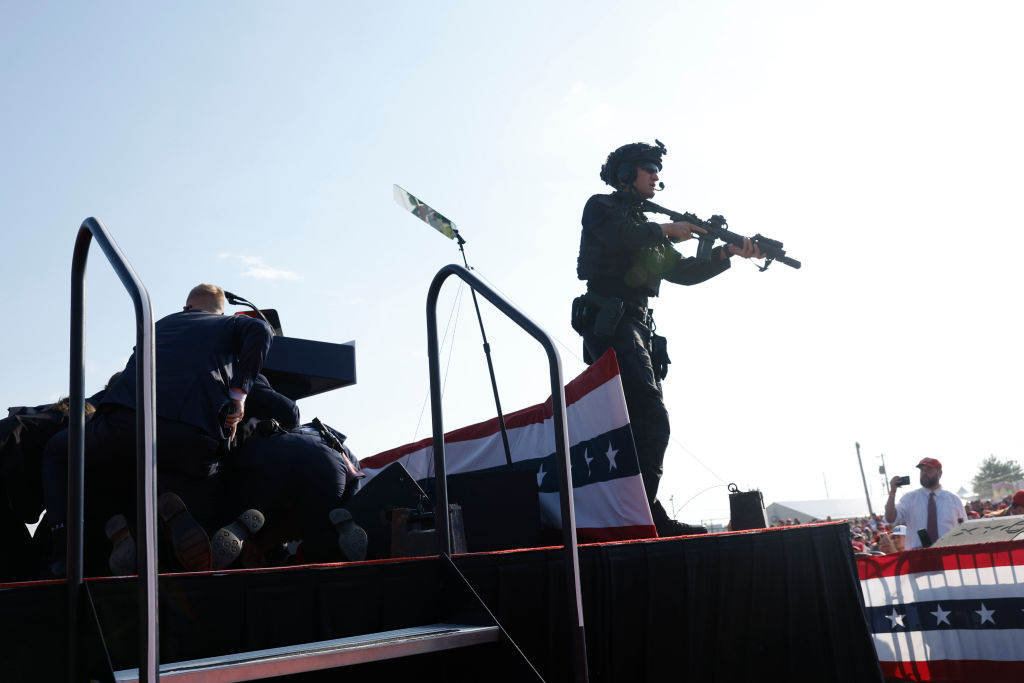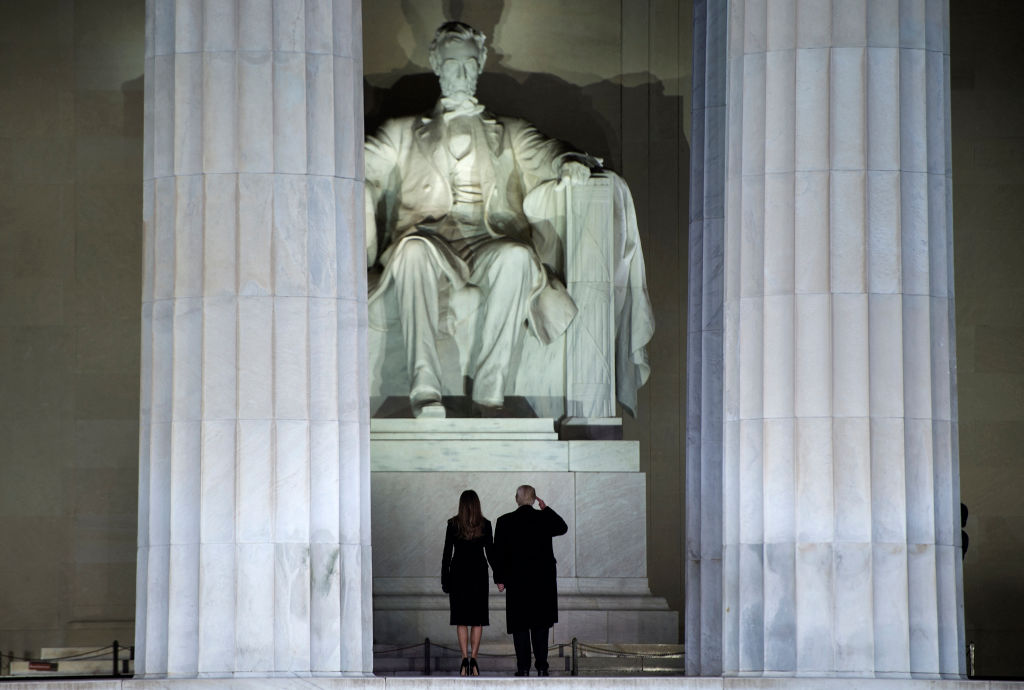To a growing crowd of irrationalists, the attempted assassination of Donald Trump is just another conspiracy theory.
The Shot Heard ‘Round the World
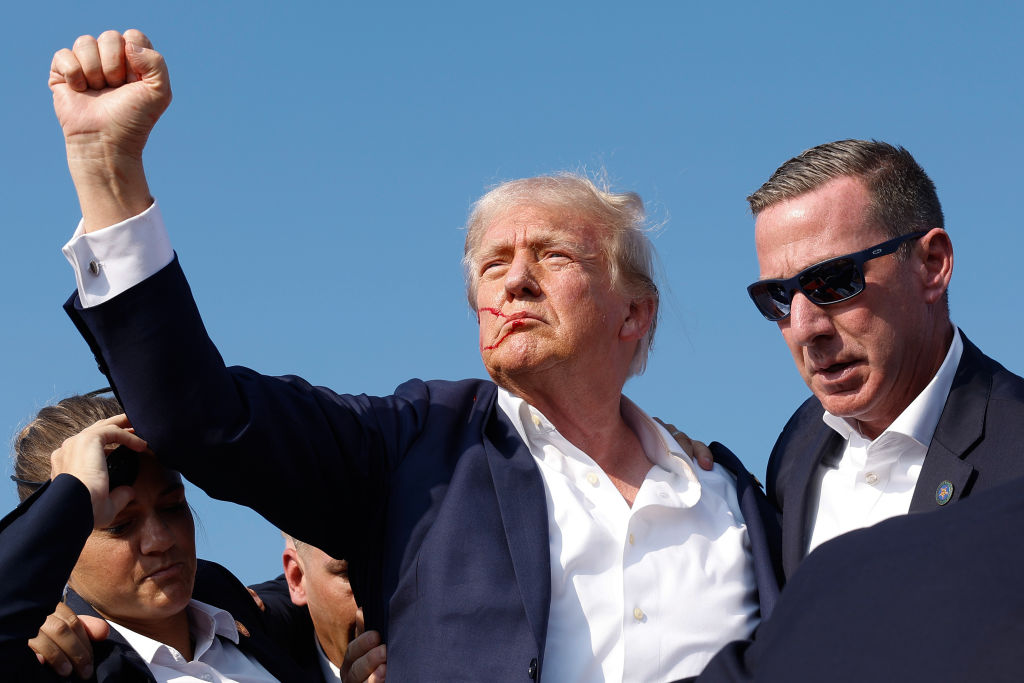
Donald Trump and America each dodged a bullet.
On Saturday, July 13, Donald Trump escaped being murdered on live television by maybe half an inch. And thank God that he did. The consequences of a presidential assassination in our fraught year of 2024 are chilling to contemplate. The events of Saturday are still hard to process. The negligent security perimeter, the miraculous miss, Associated Press photojournalist Evan Vucci’s world-historical shot of Trump with his fist in the air with blood dripping down his face, and the tragic death of innocent bystander Corey Comperatore, a father who got caught in the crossfire as he tried to shield his family from the barrage. We are reminded of the pivotal yet mysterious role providence or fortune play in the lives of men and nations. (“I’m not supposed to be here,” Trump told Michael Goodwin on Sunday night on the plane to Milwaukee—he meant still here with us, the living.)
What are we to make of this, and what does it mean for our politics? I suspect it will mean that Trump is now heavily favored to win this election, and perhaps by an Electoral College margin we haven’t seen in decades. I have been responding to confident pro-Trump Claremont supporters, friends, and fellows in recent months, often to their dismay, with a prediction that this election is a coin-toss. That all changed on Saturday in Pennsylvania. D.C. is doing what D.C. does, and leaking details from Democrat operatives in despair. Trump will benefit from the natural sympathy one would expect after such an event, even from some unlikely quarters. And to say he responded with poise understates considerably the political power of the imagery captured by photographers and on video. The improbable details and result of Saturday are a cultural-political phenomenon the likes of which we have not witnessed in American politics in a long time.
The immediate response from some mainstream media institutions was equal parts bizarre and shameful. CNN: “Secret Service rushes Trump off stage after he falls at rally;” The Washington Post: “Trump escorted away after loud noises at Pa. rally;” USA Today: “Trump removed from stage by Secret Service after loud noises startles [sic] former president, crowd;” NBC News: “Secret Service rushes Trump off stage after popping noises heard at rally ahead of the RNC;” and, well, you get the idea. Anyone who has been to a gun range knows those “loud noises” weren’t fireworks or a car backfiring. The series of headlines are a sign of the moral and political cowardice of our modern mainstream media. The most charitable reading would be that their collective editorial leadership has lost all common sense, judgment, and ability to convey facts in context to their fellow citizens.
This surreal response by so many once-venerable institutions of journalism is part of the backdrop of what we at Claremont (starting with the late, great Angelo Codevilla) have called a kind of Cold Civil War. For that we have been accused by the Left and Never Trump Right of delusion or intemperance. We maintain that we’re merely observing the political reality on display, drawing on our study of the political history of the West. In 2019 we published here at The American Mind Angelo’s essay, “Our Revolution’s Logic.” He tried to analyze the dizzying and alarming trajectory of American politics since Donald Trump’s defeat of Hillary Clinton in 2016. That trajectory, Angelo argued, was the result not of Donald Trump, but of the reaction to his electoral victory by what Angelo called America’s ruling class—the constellation of philosophically and politically progressive institutions and politicians of the establishment in Washington, D.C., including many Republicans.
The essence of this ruling class stance is that duly-elected Republican presidents since Nixon are regarded as presumptively illegitimate. The conclusion of many members of the ruling class, high and low, seems to be that extraordinary and extra-constitutional measures are justified in opposing Republican rule. Donald Trump’s election super-charged this collective judgment and led to an orgy of extra-constitutionalism that continues to hound him, even out of office. This fact of national political life in recent decades, coupled with Progressivism’s century-long tendency to remove lawmaking and all manner of policy from popular and constitutional control more broadly, has had the net effect of a rolling soft-disenfranchisement of half the American population. The most recent illustration of such irresponsible and historically histrionic rhetoric was The New Republic’s recent cover feature, “American Fascism: What It Would Look Like,” a stylized black-and-white image of Donald Trump’s face with a Hitler mustache, in case anyone was wondering what they meant.
The Biden Administration has made explicit—rhetorically from the president himself and as a matter of national security policy—that many millions of members of the opposition party present a threat to democracy. The key piece of the rhetorical presentation came at Biden’s September 1, 2022 speech in front of Independence Hall in Philadelphia. This was its rhetorical centerpiece: “Donald Trump and the MAGA Republicans represent an extremism that threatens the very foundations of our republic.” The key piece of national security policy on the domestic front came in the Biden-Harris administration’s 2022 National Security Strategy, which Biden paraphrased in a May 13, 2023 address at Howard University, calling white supremacy “the most dangerous threat” to America at home.
So, it was a bit rich on Sunday night when Biden opened a stumbling address to the nation on the attempted assassination of President Trump with the following: “My fellow Americans, I want to speak to you tonight about the need for us to lower the temperature in our politics and to remember, while we may disagree, we are not enemies. We’re neighbors. We’re friends, coworkers, citizens, and, most importantly, we are fellow Americans.” He continued a bit later in the short address, “You know, the political rhetoric in this country has gotten very heated. It’s time to cool it down. And we have a responsibility to do that. Yes, we have deeply felt, strong disagreements. The stakes in this election are enormously high. I’ve said it many times that the choice we make in this election is gonna shape the future of America and the world for decades to come.”
Biden should be commended for condemning violence, but his calls for lowering the rhetorical temperature rightly ring hollow to millions of Americans. Joe Biden has always been a notorious gaffe-factory, and production is up as he declines with advanced age. With impeccably bad timing given the occasion of the speech, he ended by garbling an Abraham Lincoln phrase about the importance of bullets not succeeding ballots: “…but in America, we resolve our differences at the battle box. You know, that’s how we do it, at the battle box, not with bullets.” One could almost hear a dozen aides and cabinet members sighing in defeat.
I’ll close with one dishonorable mention for Commentary editor John Podhoretz. On a special Sunday edition of the Commentary podcast, Podhoretz laid significant blame for our current national political climate at the feet of my colleague and friend Michael Anton and his famous 2016 essay, “The Flight 93 Election.” After Matt Continetti and Abe Greenwald had praised Trump’s conduct of late, as well as his extraordinary response at the rally once he got up off the ground, Podhoretz wanted to be sure his listeners understood that both sides are to blame for our current predicament. He said, without naming Anton, “What was the Flight 93 election essay, after all, but a kind of warning that … extraordinary means needed to be taken to save the country from its own self-destruction, which would include flying the plane of state, smashing it into the ground to see if you could somehow recover it or whatever that analogy was exactly supposed to mean.” Podhoretz meant to imply that Anton’s evocative title and opening paragraphs of the essay were the equivalent of a call (or too close to a call for Podhoretz’s gentle sensibilities) to political violence. As Anton has pointed out repeatedly, the substance of the rest of the essay was a plea to his disaffected fellow citizens on the Right and Center to swallow their misgivings about Trump and buy the American experiment some time to save itself after a century of increasingly aggressive and illiberal (in the Founders’ sense) progressivism by…voting in a presidential election.
I encourage our readers to re-read “The Flight 93 Election” and judge Anton’s perspicacity, rhetorical gifts, public spirit, and small-r republicanism for themselves. I think he has been vindicated in spades. Trump’s 2016 election was a respite from a likely irreversible turn toward a firmly cemented Progressive oligarchy in America. May his next administration be a more decisive turn yet towards a new birth of freedom.
The American Mind presents a range of perspectives. Views are writers’ own and do not necessarily represent those of The Claremont Institute.
The American Mind is a publication of the Claremont Institute, a non-profit 501(c)(3) organization, dedicated to restoring the principles of the American Founding to their rightful, preeminent authority in our national life. Interested in supporting our work? Gifts to the Claremont Institute are tax-deductible.
Trump’s near-death experience gives him a second chance.
Trump’s defense of the self-evident truths of our Founding should give way to a Lincolnian reconciliation.
Under the Left’s doctrine of stochastic terrorism, the culprits for the assassination attempt range far and wide.
Now is the time to challenge anti-American extremism.

